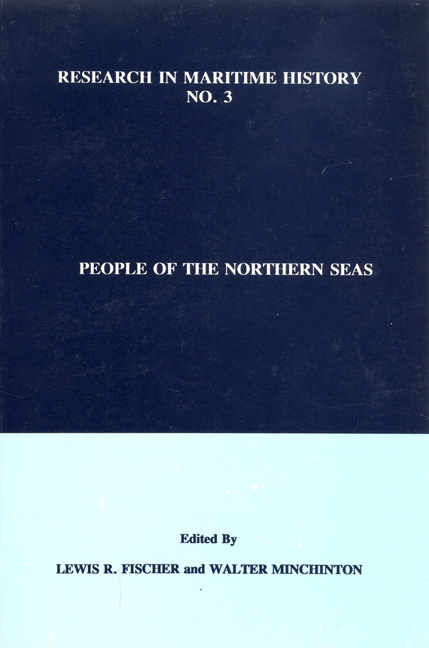Book contents
- Frontmatter
- Contents
- About the Editors
- Contributors
- General Introduction
- “Une Petite Republique” in Southwestern Newfoundland: The Limits of Imperial Authority in a Remote Maritime Environment”
- “Changes in Aleut Communities Following Russian Contact”
- “Five Years Before the Mast: Observations on the Conditions of Maritime Labour in Finland and Elsewhere”
- “Expressions of Longing, Sources of Anxiety? The Significance of Contacts with Home for Finnish Sailors in London and Hull in the Late Nineteenth Century”
- “Death of a Merchant”
- “St. Petersburg's Bills of Exchange in the Russian Economy of the Eighteenth Century”
- “Shipowners and Iron Sailing Ships: The First Twenty Years, 1838-1857”
- “The Growth of Norwegian Shipbroking: The Practices of Fearnley and Eger as a Case Study, 1869-1914”
- “Captain John Deane: Mercenary, Diplomat and Spy”
- “Her Majesty's Coastguard”
- “Coastal Life, ‘Nordic Culture’ and Nation State: Reflections on the Formation of the Nation State and Maritime History”
“Coastal Life, ‘Nordic Culture’ and Nation State: Reflections on the Formation of the Nation State and Maritime History”
- Frontmatter
- Contents
- About the Editors
- Contributors
- General Introduction
- “Une Petite Republique” in Southwestern Newfoundland: The Limits of Imperial Authority in a Remote Maritime Environment”
- “Changes in Aleut Communities Following Russian Contact”
- “Five Years Before the Mast: Observations on the Conditions of Maritime Labour in Finland and Elsewhere”
- “Expressions of Longing, Sources of Anxiety? The Significance of Contacts with Home for Finnish Sailors in London and Hull in the Late Nineteenth Century”
- “Death of a Merchant”
- “St. Petersburg's Bills of Exchange in the Russian Economy of the Eighteenth Century”
- “Shipowners and Iron Sailing Ships: The First Twenty Years, 1838-1857”
- “The Growth of Norwegian Shipbroking: The Practices of Fearnley and Eger as a Case Study, 1869-1914”
- “Captain John Deane: Mercenary, Diplomat and Spy”
- “Her Majesty's Coastguard”
- “Coastal Life, ‘Nordic Culture’ and Nation State: Reflections on the Formation of the Nation State and Maritime History”
Summary
Maritime history fascinates large segments of the public; the success of maritime museums and nautical archaeology are but the most spectacular expressions of this phenomenon. Ironically, it is precisely this interest which often arouses the scorn of professional historians. To quote Frank Broeze,
many people, and not only outside the field, believe that maritime history is all about ships and navigation, and about nothing else. All too often, this very narrow field was and still is tainted by the brushes of hero-worshipping (of ships as well as of individuals) and antiquarianism-the desire to know detailed facts for the sake of detail…[T]he considerable achievements of maritime archaeology and maritime museums…have not always had a beneficial effect, as artifacts more often than not are closely linked to ships and shipwrecks and well-nigh inevitably, rarely add up to a complete story, let alone a full addressing of historically important issues.
Maritime history enjoys the anecdote and suffers the drawbacks. I am sure that many historians envy us for having beautiful objects like the Wasa to put on display. On the other hand, others will retort that there are phenomena more central to the human experience than an error-filled naval reconstruction.
I believe that it is vital to conceive of maritime history as a truly international discipline that is sufficiently open to shed the shackles of national boundaries and confident enough to draw insights from a whole range of disciplines. In this essay I would like to make some observations based on recent developments in Nordic historiography to demonstrate not only some of the potential but also some of the pitfalls of adopting this type of broad approach.
The first question to be addressed is why maritime history is so crucial. Certainly it is not because those with maritime orientations were a majority. From a purely numeric perspective, maritime people have been almost everywhere a small minority. Even in a seagirt country like Denmark, the active maritime male population, including everyone from dockers to farmers who derived some income from fishing, numbered only about 35,000 at the turn of this century. Counting their families, they comprised perhaps 140,000 people in a population of three million, or less than five percent of the total.
- Type
- Chapter
- Information
- People of the Northern Seas , pp. 191 - 204Publisher: Liverpool University PressPrint publication year: 1992



